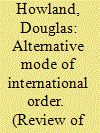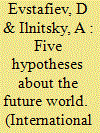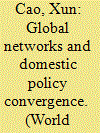| Srl | Item |
| 1 |
ID:
139574


|
|
|
|
|
| Summary/Abstract |
A novel form of international order was developed in the nineteenth century by international administrative unions such as the International Telegraph Union and the Universal Postal Union. This administrative internationalism posed a striking alternative to the international society of great powers, sovereignty, and forms of imperial domination, for the members of administrative unions included not only sovereign states but also semi-sovereigns, vassals, and colonies. Members were equal and bound identically to the union treaty and its international administrative law. This article examines the structure of unions and their politics of membership in the nineteenth century, and engages theories of global governance to argue that early administrative unions present a mode of international order different from theories of both global networks and the international system of neorealism.
|
|
|
|
|
|
|
|
|
|
|
|
|
|
|
|
| 2 |
ID:
101822


|
|
|
|
|
| Publication |
2011.
|
| Summary/Abstract |
This article examines how Turkish citizens participated in protests against the Iraq War and why civil society organizations were able to mobilize tens of thousands of people across the country despite the institutional weakness of the Turkish peace movement. The Iraq War case is important in that its scale and level of protest mobilization were unprecedented based on any other anti-war protests in Turkey. Using content analysis of newspaper reports of anti-Iraq War protest events, this article maps the patterns and forms of protest against the Iraq War and argues for the importance of global networks, coalitions among organizations, and political context for protest mobilization.
|
|
|
|
|
|
|
|
|
|
|
|
|
|
|
|
| 3 |
ID:
175954


|
|
|
| 4 |
ID:
140320


|
|
|
|
|
| Summary/Abstract |
For more than two decades, the Financial Action Task Force (FATF) has been the central governance network for developing anti-money laundering policies. It serves as a prototype of a new form of governance, linked to soft law, peer reviews, and expert advice. Literature on the FATF, however, rarely questions the transferability of this model to other areas of global governance. Seeking to fill this gap, this article analyzes the networking activities that created and maintain the FATF. I argue that two major difficulties are particularly challenging for any global governance network: initiation problems and commitment problems. The article describes how the FATF’s members have overcome these difficulties and developed the network over time. It also shows that some tools and conditions that contributed to the FATF’s success are difficult to replicate for other networks. The conclusions outline some ways to overcome these challenges and present further questions for research.
|
|
|
|
|
|
|
|
|
|
|
|
|
|
|
|
| 5 |
ID:
114495


|
|
|
|
|
| Publication |
2012.
|
| Summary/Abstract |
National economies are embedded in complex networks such as trade, capital flows, and intergovernmental organizations (igos). These globalization forces impose differential impacts on national economies depending on a country's network positions. This article addresses the policy convergence-divergence debate by focusing on how networks at the international level affect domestic fiscal, monetary, and regulatory policies. The author presents two hypotheses: first, similarity in network positions induces convergence in domestic economic policies as a result of peer competitive pressure. Second, proximity in network positions facilitates policy learning and emulation, which result in policy convergence. The empirical analysis applies a latent-space model for relational/dyadic data and indicates that position similarity in the network of exports induces convergence in fiscal and regulatory policies; position similarity in the network of transnational portfolio investments induces convergence in fiscal policies; and position proximity in igo networks is consistently associated with policy convergence in fiscal, monetary, and regulatory policies.
|
|
|
|
|
|
|
|
|
|
|
|
|
|
|
|
| 6 |
ID:
154926


|
|
|
|
|
| Summary/Abstract |
We examine what leads states to accommodate enduring, international rivals in response to immediate threats. Drawing from network theory, we hypothesize that the direct and indirect ties the threatened state’s rivals form with each other and with other states in the global system play a critical role in shaping crisis. A threatened state should be more likely to accommodate rivals with economic connections to other actors. These connections generate influence, through leverage or information that can lead to crisis de-escalation. A threatened state is less likely to accommodate a rival that has military alliances with other rivals because credible allies are less likely to respond to such overtures. We use network analysis and data from the post–Cold War era to support the argument, shedding light on the importance of local and global connectivity in conflict management.
|
|
|
|
|
|
|
|
|
|
|
|
|
|
|
|